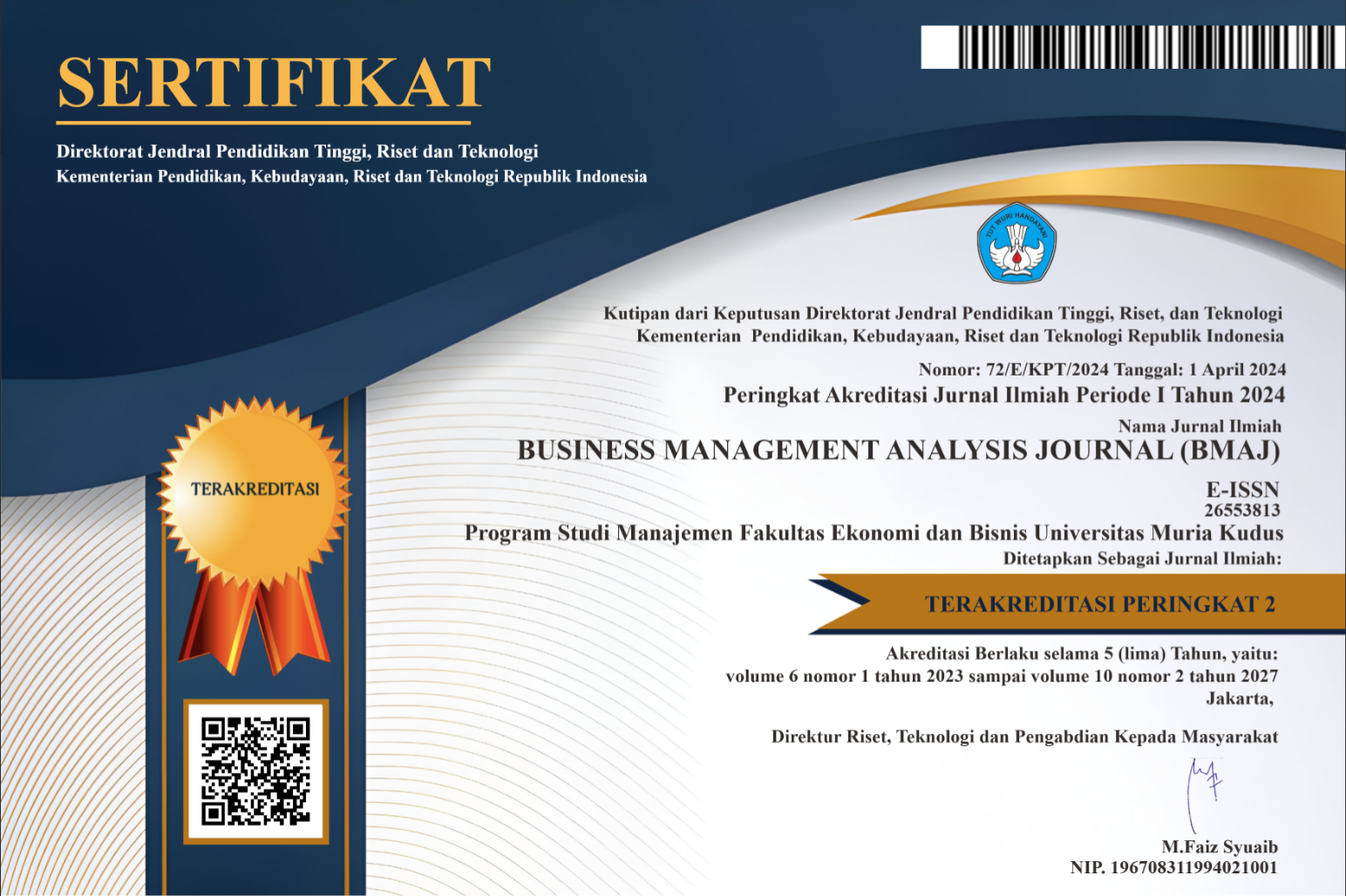PENGEMBANGAN ORGANIZATIONAL CITIZENSHIP BEHAVIOR (OCB) MELALUI PENINGKATAN WORKPLACE SPIRITUALITY DAN ISLAMIC WORK ETHICS
Abstract
Keywords
Full Text:
PDF (Bahasa Indonesia)References
Achour, M., Grine, F., Roslan, M., & Nor, M. (2015). Measuring Religiosity and Its Effects
on Personal Well-Being : A Case Study of Muslim Female Academicians in Malaysia.
Journal of Religion and Health, 984–997. https://doi.org/10.1007/s10943-014-9852-0
Arabi, S. H. (2016). Well-being orthodox theories and Islamic views. International Journal of
Social Economics, 43(2), 190–204. https://doi.org/10.1108/IJSE-01-2013-0019
Arshad, M. (2011). interdisciplinary journal o f contemporary research in business, 1160–
Ashmos, D. P., & Duchon, D. (2000). Spirituality at Work: A Conceptualization and
Measure. Journal of Management Inquiry, 9(2), 134–145.
https://doi.org/10.1177/105649260092008
Chen, C. Y., & Yang, C. F. (2012). The Impact of Spiritual Leadership on Organizational
Citizenship Behavior: A Multi-Sample Analysis. Journal of Business Ethics, 105(1),
–114. https://doi.org/10.1007/s10551-011-0953-3
Chen, Y. S. (2008). The positive effect of green intellectual capital on competitive advantages
of firms. Journal of Business Ethics, 77(3), 271–286. https://doi.org/10.1007/s10551-
-9349-1
Fiorillo, D., & Nappo, N. (2014). Job satisfaction in Italy: individual characteristics and
social relations. International Journal of Social Economics, 41(8), 683–704.
https://doi.org/10.1108/IJSE-10-2012-0195
Fry, L. W., & Cohen, M. P. (2009). Spiritual leadership as a paradigm for organizational
transformation and recovery from extended work hours cultures. Journal of Business
Ethics, 84(SUPPL. 2), 265–278. https://doi.org/10.1007/s10551-008-9695-2
Fry, L. W., Vitucci, S., & Cedillo, M. (2005). Spiritual leadership and army transformation:
Theory, measurement, and establishing a baseline. Leadership Quarterly, 16(5), 835–
https://doi.org/10.1016/j.leaqua.2005.07.012
Gupta M, Kumar V, and Si. M. (n.d.). Creating Satisfied Employees Through Workplace
Spirituality.pdf.
Gupta M. Kumar V, and Singh M. (2014). Creating Satisfied Employees Through Workplace
Spirituality: A Study of the Private Insurance Sector in Punjab (India). J Bus Ethics
(2014) 122:79-88; DOI 10.1007/s10551-013-1756-5
Karakas, F. (2010). Spirituality and performance in organizations: A literature review.
Journal of Business Ethics, 94(1), 89–106. https://doi.org/10.1007/s10551-009-0251-5
Kaya, A. (2015). The Relationship between Spiritual Leadership and Organizational
Citizenship Behaviors: A Research on School Principals’ Behaviors. Educational
Sciences: Theory & Practice, 15(3), 597–607. https://doi.org/10.12738/estp.2015.3.1988
Khan, K., Abbas, M., Gul, A., & Raja, U. (2013). Organizational Justice and Job Outcomes:
Moderating Role of Islamic Work Ethic. Journal of Business Ethics, 126(2), 235–246.
https://doi.org/10.1007/s10551-013-1937-2
Kolodinsky, R. W., Giacalone, R. A., & Jurkiewicz, C. L. (2008). Workplace values and
outcomes: Exploring personal, organizational, and interactive workplace spirituality.
Journal of Business Ethics, 81(2), 465–480. https://doi.org/10.1007/s10551-007-9507-0
Kutcher, E. J., Bragger, J. D., Rodriguez-srednicki, O., & Masco, J. L. (2010). The Role of
Religiosity in Stress , Job Attitudes , and Organizational Citizenship Behavior, 319–337.
https://doi.org/10.1007/s10551-009-0362-z
Milliman, J., Czaplewski, A. ., & Ferguson, J. (2003). Workplace spirituality and Employee
Work Attitudes - An Exploratory Empirical Assessment. Journal of Organizational
Change Management, 16(4), 426–447. https://doi.org/10.1108/09534810310484172
Mitroff, I. A., Denton, E. A., & Alpaslan, C. M. (2009). A Spiritual Audit of Corporate
America: Ten Years Later, 1–27.
Pawar, B. S. (2009). Workplace spirituality facilitation: A comprehensive model. Journal of
Business Ethics, 90(3), 375–386. https://doi.org/10.1007/s10551-009-0047-7b
Pawar, B. S. (2014). Leadership Spiritual Behaviors Toward Subordinates: An Empirical
Examination of the Effects of a Leader’s Individual Spirituality and Organizational
Spirituality. Journal of Business Ethics, 122(3), 439–452.
https://doi.org/10.1007/s10551-013-1772-5
Rokhman, W., & Hassan, A. (2012). The effect of Islamic work ethic on organisational
justice. African Journal of Business Ethics, 6(1), 25. https://doi.org/10.4103/1817-
104699
THe Relationship Between Spirituality And Job Satisfact Ion By Freda Van Der Walt
Submitted in partial fulfilment of the requirements for the Degree DOCTOR OF
PHILOSOPHY ( PhD ) In Organizational Behaviour in the Faculty of Eco. (2007),
(April).
Underwood, L. G. (2011). The Daily Spiritual Experience Scale: Overview and Results, 29–
https://doi.org/10.3390/rel2010029
Yousef, D. A. (2000). Organizational commitment as a mediator of the relationship between
Islamic work ethic and attitudes toward organizational change. Human Relations, 53(4),
–537. https://doi.org/10.1177/0018726700534003
DOI: https://doi.org/10.24176/bmaj.v2i2.3878
Refbacks
- There are currently no refbacks.
Copyright (c) 2019 Business Management Analysis Journal (BMAJ)
View My Stats
Member of:
Indexed by:
Business Management Analysis Journal (BMAJ) is licensed under a Creative Commons Attribution-ShareAlike 4.0 International License.
Dedicated to:









